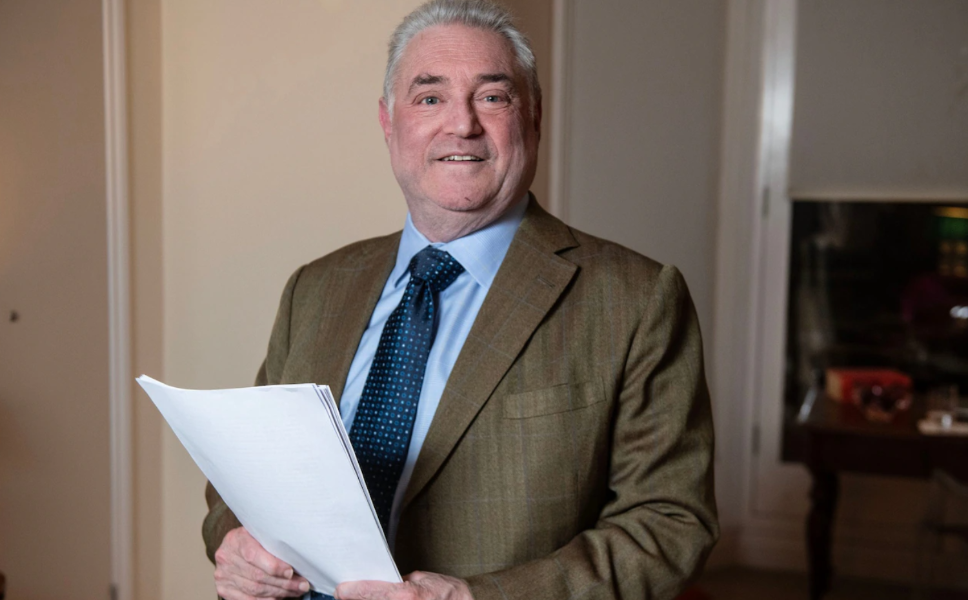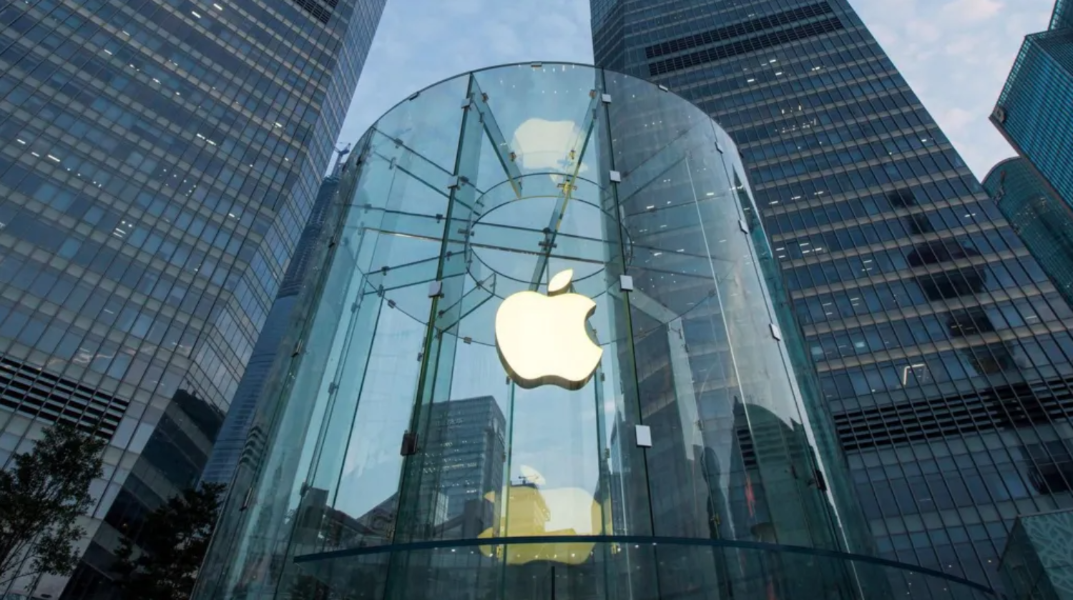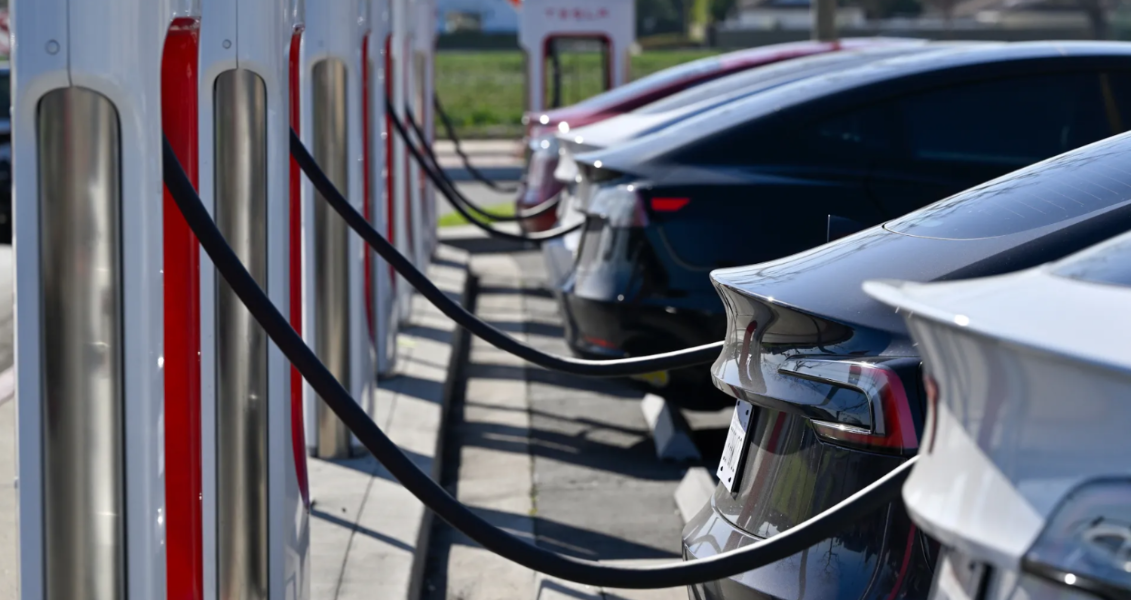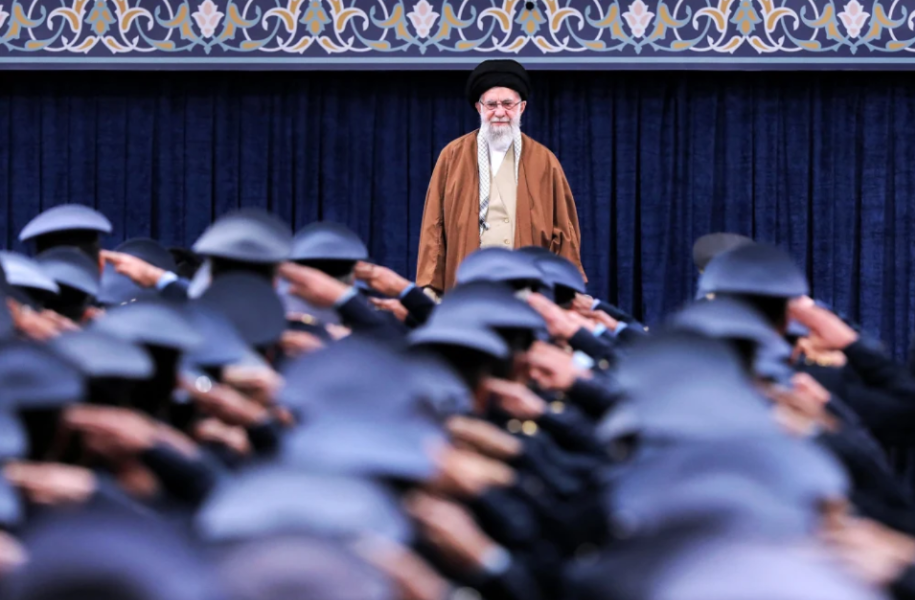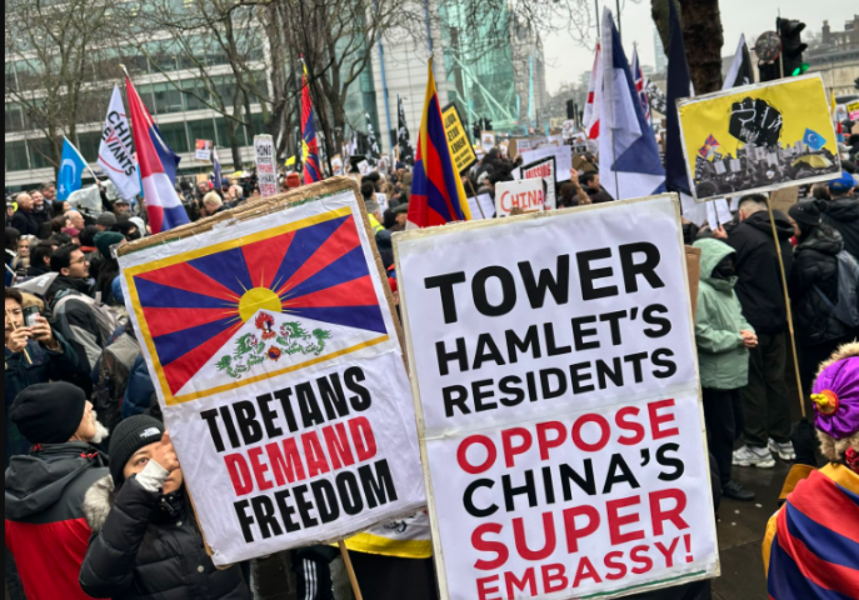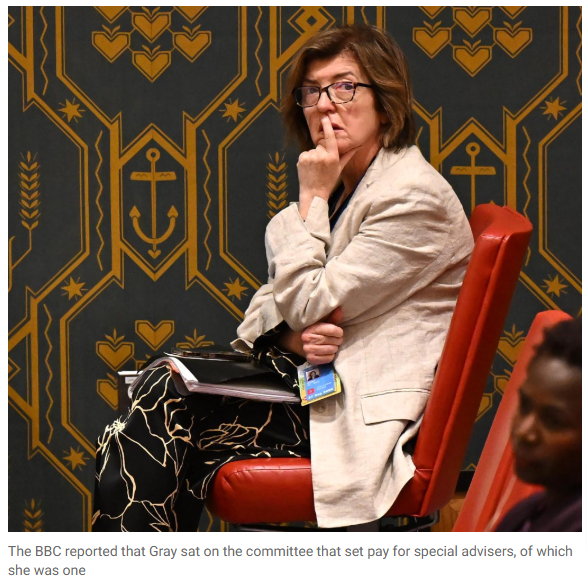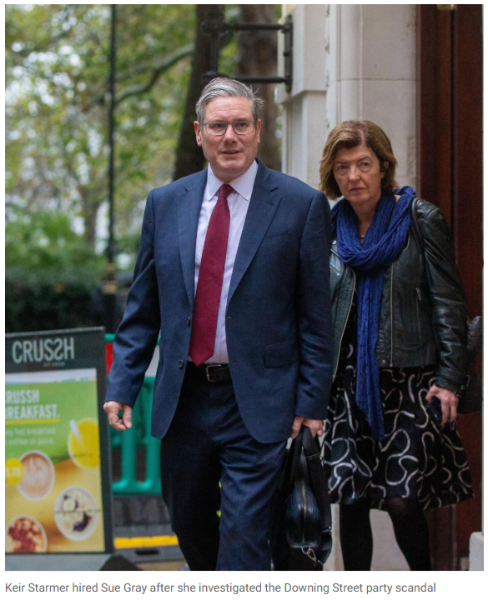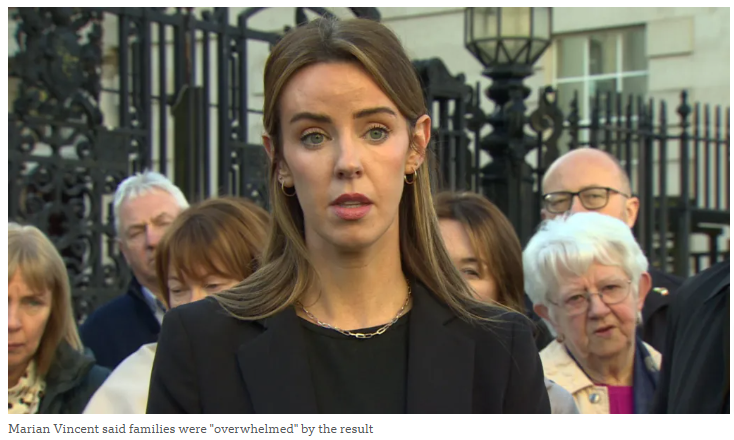-
Posts
10,773 -
Joined
-
Last visited
Content Type
Events
Forums
Downloads
Quizzes
Gallery
Blogs
Everything posted by Social Media
-
Trump has expressed deep concern over the condition of three Israeli hostages released by Hamas on Saturday, comparing their frail and emaciated appearance to Holocaust survivors. Speaking to reporters aboard Air Force One, he warned that the United States' patience could eventually wear thin. I watched the hostages come back today. And they looked like Holocaust surivors. They were in horrible condition. They were emacitated. It looked like many years ago the Holocaust survivors. I don't know how much longer we can take that...We're going to lose our patience" He emphasized how much their appearance had changed, saying, “They look like they haven’t had a meal in a month. These were healthy people a reasonably short number of years ago, and now they look like they’ve aged 25 years. They literally look like the old pictures of Holocaust survivors, the same thing. No reason for that.” Trump acknowledged that under the current ceasefire and hostage agreement, captives were expected to be released gradually, but he highlighted the severity of their mistreatment. “They are in really bad shape, they have been treated brutally, horribly. Even the ones that came out earlier, they were in a little bit better shape, but mentally they were treated so badly. Who could take that?” he asked. He concluded his remarks with a warning, suggesting that the situation could push the United States to take further action. “You know, at some point, we’re gonna lose our patience.” Based on a report by Sky News | TOI 2025-02-11
-
CNN found itself at the center of ridicule on Friday night after an embarrassing on-air mistake that mistakenly conflated former President Barack Obama with Osama bin Laden. The blunder led to widespread mockery, further tarnishing the network’s struggling reputation. During a segment on *CNN News Central*, a graphic appeared behind anchor Boris Sanchez, erroneously reading “OBAMA BIN LADEN.” The report was covering President Trump’s plan to send illegal migrants to Guantanamo Bay, Cuba, and included a discussion about Al-Qaeda terrorist Abu Zubaydah, who remains imprisoned at the controversial detention facility. While Sanchez did not utter the mistaken phrase, the glaring error on the screen did not go unnoticed. The graphic, displayed in bold all-caps, read: “OBAMA BIN LADEN ASSOCIATE: ABU ZUBAYDAH.” Obama had previously pledged to shut down Guantanamo Bay, a promise that ultimately went unfulfilled. His inability to close the facility paved the way for Trump’s proposed initiative to transfer up to 30,000 criminal migrants there. The mistake sparked instant reactions online, with many finding humor in the high-profile gaffe. “CNN is gone. Might as well turn off the lights,” quipped X user Clara Winslow. Another user, Daniel, questioned the network’s credibility, writing: “Freudian slip much CNN?” Some viewers, however, were convinced the mistake was more than just an accident. “That was not a misprint. Shame on whoever did that,” a liberal-leaning account on X stated, suggesting intent behind the error. The incident adds to a growing list of challenges for CNN. The network, long criticized by former President Trump and his supporters, has been struggling with declining viewership and ongoing staff reductions. Just last month, CNN cut 200 jobs as part of a wave of layoffs across the company. Prominent anti-Trump figures like Jim Acosta have also recently departed, further signaling the network’s internal turmoil. Based on a report by NYP 2025-02-11
-
The arrival of American sports bar chain Hooters in Newcastle upon Tyne has sparked backlash among locals, with critics accusing the company of promoting the objectification of women. Known for its signature hot wings and female servers dressed in revealing uniforms, the franchise is attempting to further establish itself in the UK, despite past failures in other British cities. Founded in Florida in 1983 as a joke by six men with no restaurant experience, Hooters has since grown to over 400 locations worldwide. While the chain already operates in Nottingham and Liverpool, the Newcastle location is expected to be a major test of its long-term viability in the UK. The new restaurant is set to occupy the ground floor of the former TJ Hughes store in the city’s Bigg Market area, with doors expected to open in late February. Signs announcing the arrival of Hooters have already appeared in Newcastle’s city center, and job postings have been advertised, offering a base pay of £11.44 per hour. Reports suggest that 45 of the 50 female staff members required for the new venue have already been hired, some as young as 17. Opposition to Hooters’ expansion is not new. Many previous attempts to open branches across the UK have failed due to strong pushback from residents and local authorities. Newcastle’s own residents have voiced concerns, with one local telling *The Guardian*, “It’s horrible. We can do better than this.” Critics argue that the brand is outdated and reinforces harmful stereotypes, with Kruti Walsh, policy director at feminist charity FiLiA, stating that the business “treats women as objects to be served up alongside chicken wings and fries.” Despite the backlash, Canadian businessman Johnny Goard, who is leading the Newcastle launch alongside Julian Mills, has defended the brand. “Hooters isn’t what you think it is,” he told *The Guardian*. “It’s a restaurant. We don’t want to be here as a bar. We do kids eat for free on Sundays. Hooters isn’t what you think it is, what you perceive it to be, until you come in the door.” This is not the first time Hooters has struggled to gain a foothold in the UK. The chain’s first attempt in Birmingham in 1998 was met with enthusiasm but shut down just 18 months later amid accusations of sexism and controversy over its proximity to the Hall of Memory memorial. A branch in Bristol, which opened in 2010, closed just two years later following an incident in which staff allegedly gave a cake shaped like naked breasts to a 12-year-old boy. Even Liverpool’s Hooters, which opened in 2022, faced resistance from local residents and then-mayor Joanne Anderson, who described the franchise as having an “infamously sexually objectifying and misogynistic environment.” Newcastle previously rejected a Hooters application over concerns regarding crime, public nuisance, and the potential for social disorder linked to stag and hen parties. However, Mills and Goard, the duo behind Nottingham’s long-standing Hooters location, are determined to succeed where past efforts have failed. Goard, dismissing concerns, pointed to nightlife culture in the city, saying, “Have you looked outside on a Friday night? What else can I say about that? We raise millions and millions of dollars for [breast cancer] charities.” As Hooters prepares to open its doors in Newcastle, the controversy surrounding the brand remains as heated as ever. Whether the franchise can overcome its critics and thrive in the UK remains to be seen. Based on a report by The Independent 2025-02-11
-
A charity trustee who was disqualified for alleged "Islamophobic" social media posts has won a significant legal victory, marking a milestone for free speech. Gary Mond, a longtime trustee of the Jewish National Fund UK (JNF UK), successfully overturned a disqualification order imposed by the Charity Commission in 2023 after historical posts deemed "anti-Muslim" surfaced online. The ruling, delivered on Thursday, is the first time such an order has been overturned on appeal. Mond, who served JNF UK for 12 years, was barred from holding trustee or senior management roles for two and a half years after the Charity Commission determined that his online activity could harm the reputation of charities he was affiliated with. While the ban was the shortest disqualification issued by the commission, the tribunal found the decision neither proportionate nor necessary, leading to its reversal. The tribunal acknowledged that some of Mond’s posts could be "perceived as anti-Islam" but upheld his right to freedom of expression. It also ruled that his social media activity between 2014 and 2021 did not render him unfit to serve as a trustee. In one post, Mond had expressed concern that if a substantial number of Muslims were elected as Labour MPs, "the Britain that we knew will have gone forever." In another, he stated that "civilisation" was "at war with Islam," later clarifying that he had intended to refer to "Islamic fundamentalism" rather than the religion itself. Additionally, the commission cited Mond’s engagement with posts from figures like Pamela Geller, an American political commentator banned from the UK for her "extremist" views. His social media activity came under scrutiny after being highlighted by news outlets. Despite the allegations, Mond, who spent over £60,000 on his legal appeal, has consistently denied any accusations of Islamophobia. The tribunal ultimately found that disqualifying Mond was not necessary "to protect public trust and confidence in charities generally." Mond, a Cambridge-educated accountant, currently chairs the advisory board for the National Jewish Assembly and has previously been involved with the Conservative Friends of Israel. Reacting to the verdict, Mond told The Telegraph: "The outcome of this case, which was an appalling waste of both taxpayers’ money and my own, says infinitely more about the Charity Commission than it does about me. It shows that a government body is prepared to judge the suitability of individuals to be charity trustees on the basis of their political beliefs and not merely their behaviour in their charity work." He emphasized that as a trustee, he had acted with integrity and had never mismanaged funds or engaged in misconduct related to charity work. "It should not be any business of the Charity Commission what I choose to write on social media on matters totally unconnected to charities," he added. Calling for accountability, he urged an investigation into the commission’s actions, asserting that its reputation had suffered as a result of the case. A Charity Commission spokesperson responded to the ruling by stating: "The outcome of this case brings more clarity to trustees’ appropriate use of social media, underlining the need for all trustees to act in the best interests of their charity, including while posting in a personal capacity." Based on a report by The Daily Telegraph 2025-02-11
-

Rising Anti-Israel Sentiments in Pai Following Tourists Misconduct
Social Media replied to webfact's topic in Chiang Mai News
A number of posts have already been removed. Reminder of the forum rules, including comment on moderation. 15. You will not discriminate or post slurs, degrading or overly negative comments on the basis of race, gender, age, religion, ethnicity, nationality, disability, medical history, marriage, civil partnership, pregnancy, maternity, paternity, gender identity, sexual orientation or any other irrelevant factor. Expect your post removed at a minimum if you do not keep to them. -
@MalcolmB antisemitic and inflammatory troll posts have been removed. Take note, you've had time out previously for breaking the below rule. It looks like you need reminding. 15. You will not discriminate or post slurs, degrading or overly negative comments on the basis of race, gender, age, religion, ethnicity, nationality, disability, medical history, marriage, civil partnership, pregnancy, maternity, paternity, gender identity, sexual orientation or any other irrelevant factor. Your final warning before you are also removed.
-
The UK government has formally demanded access to encrypted data stored in Apple's cloud services worldwide, a move that could significantly impact user privacy. Currently, only the account holder can access their stored data, with Apple itself unable to view the contents. This request has been issued under the Investigatory Powers Act (IPA), which mandates that companies provide data to law enforcement when required. Apple has not commented on the matter but maintains on its website that privacy is a "fundamental human right." Due to the law's provisions, the request remains confidential. Initial reports on the issue surfaced in the Washington Post, citing anonymous sources, and the BBC has since corroborated these claims with similar contacts. The Home Office, for its part, has refused to confirm or deny the existence of such a demand, stating, "We do not comment on operational matters." Privacy International has denounced the request as an "unprecedented attack" on individual privacy. Caroline Wilson Palow, the charity's legal director, criticized the move, stating, "This is a fight the UK should not have picked. This overreach sets a hugely damaging precedent and will embolden abusive regimes the world over." The demand specifically targets data stored under Apple's "Advanced Data Protection" (ADP), an optional feature employing end-to-end encryption. This ensures that only the user can access their data, with even Apple itself locked out. While ADP significantly enhances security, it comes with the downside of rendering data unrecoverable if a user loses access to their account. The exact number of people who opt for this feature remains unknown. Despite fears of mass surveillance, the UK government's request appears to focus on national security concerns. It is believed that law enforcement would need to follow a legal process and obtain specific permissions to access data on an individual basis, similar to the existing protocol for unencrypted data. Apple has previously taken a strong stance against government demands to weaken encryption. The company has stated it would rather withdraw services like ADP from the UK market than comply with requests to create "back doors" in its products. Cyber security experts caution that any such access point could eventually be exploited by malicious actors. Furthermore, the reach of the Investigatory Powers Act extends beyond UK borders, applying to any technology firm with a presence in the UK, regardless of where they are headquartered. To date, no Western government has successfully compelled major tech companies like Apple to compromise their encryption standards. Apple has a history of resisting such demands. In 2016, it refused a U.S. court order to develop software granting officials access to the iPhone of a mass shooter. The FBI ultimately found an alternative method to bypass the encryption. Similar cases have since emerged, including a 2020 incident where Apple declined to unlock the phones of a perpetrator involved in a mass shooting at a U.S. air base. The FBI later confirmed it had managed to access the devices independently. The legislation dictates that while Apple can appeal the UK government's demand, it must comply in the interim, even if the ruling is ultimately overturned. The UK government argues that encrypted services hinder criminal investigations, a stance echoed by the FBI in its criticism of ADP. Cyber security experts have reacted with concern. Professor Alan Woodward of Surrey University said he was "stunned" by the news, while privacy group Big Brother Watch described it as "troubling." The organization warned that "this misguided attempt at tackling crime and terrorism will not make the UK safer, but it will erode the fundamental rights and civil liberties of the entire population." On the other hand, the NSPCC, a UK children's charity, has argued that encryption enables child abusers to share illicit content without detection. However, Apple has consistently maintained that privacy remains a core principle of its products and services. In 2024, Apple challenged proposed changes to the Investigatory Powers Act, labeling them an "unprecedented overreach" by the government. The amendments included provisions granting the government veto power over new security measures before they could be implemented—changes that have since been enshrined in law. Lisa Forte, a cyber security expert from Red Goat, remains skeptical about the effectiveness of such measures. "The main issue that comes from such powers being exercised is that it's unlikely to result in the outcome they want," she said. "Criminals and terrorists will just pivot to other platforms and techniques to avoid incrimination. So it's the average, law-abiding citizen who suffers by losing their privacy." Based on a report by BBC 2025-02-10
-
The Federal Highway Administration (FHA) announced Thursday that it is suspending the Biden-era National Electric Vehicle Infrastructure (NEVI) program, a $5 billion initiative aimed at expanding the country’s EV charging network. The move is part of a broader effort by the Trump administration to roll back previous energy and environmental policies. In a letter to state transportation directors, the FHA stated that the Department of Transportation (DOT) is rescinding all existing guidance related to NEVI and will introduce new guidelines that align with the administration’s current priorities. Until then, no new funding obligations under the program will be allowed. The FHA has said it plans to release new guidance for public comment in the spring. The NEVI program, funded through the Bipartisan Infrastructure Law, was designed to address gaps in the U.S. EV charging network. More than $3 billion has already been allocated to states under the initiative, with Texas being the largest recipient of funds. However, with this sudden suspension, state-level plans carefully developed in coordination with businesses, utilities, and communities may now be in jeopardy. The decision is the latest in a series of Trump administration efforts to freeze funding that had already been approved by Congress. Democratic lawmakers have criticized such actions, arguing that they violate the 1974 Impoundment Control Act, which prevents the executive branch from withholding or delaying the disbursement of funds authorized by Congress. Newly confirmed White House budget director Russell Vought, however, has expressed his belief that the law is unconstitutional. The Environmental Protection Agency (EPA) has similarly moved to halt climate and EV-related funding under the Inflation Reduction Act. Additionally, both the EPA and the Justice Department announced this week that they are shutting down their environmental justice offices. The suspension of NEVI funding has drawn sharp criticism from environmental groups and clean energy advocates. The Sierra Club, one of the nation’s largest environmental organizations, condemned the decision in a statement on Friday. “Freezing these EV charging funds is yet another one of the Trump administration’s unsound and illegal moves," said Katherine García, Director of the Sierra Club’s Clean Transportation for All program. "This is an attack on bipartisan funding that Congress approved years ago and is driving investment and innovation in every state, with Texas as the largest beneficiary. Throwing out states’ plans, which were carefully built together with business, utilities, and communities, only hurts America’s growing clean energy economy.” The move could have significant consequences for the U.S. EV market, which has been expanding rapidly in recent years. With federal funding now in limbo, states and private companies may have to adjust their plans, potentially slowing the progress of the country’s transition to electric transportation. As the administration prepares to release its revised NEVI guidelines, the battle over EV infrastructure funding is likely to continue, with legal and political challenges expected in the months ahead. Based on a report by The Hill 2025-02-10
-
The Taliban have expressed their readiness to establish a fresh relationship with the United States under Donald Trump’s leadership while firmly asserting ownership over the military equipment left behind by American and NATO forces. Abdul Qahar Balkhi, the Taliban’s foreign ministry spokesperson, spoke to CBS News on Wednesday, stating that Afghanistan’s ruling group was open to diplomatic engagement with the US. "We would like to close the chapter of warfare and open a new chapter," Mr. Balkhi said. When questioned about the possibility of returning the military hardware, he dismissed any such prospect, stating, "These are the assets of the state of Afghanistan. They will continue to be in the possession of the state of Afghanistan." The Pentagon has previously reported that military equipment worth over $7.2 billion was transferred to Afghan forces when NATO withdrew in August 2021. This arsenal included aircraft, air-to-ground munitions, battle tanks, Humvees, tracked vehicles, bulletproof vests, camouflage uniforms, weapons, communications gear, and other materials. Over the years, much of this equipment has either deteriorated or been dismantled by Taliban forces. Balkhi also clarified that there was no formal agreement between the US and Afghanistan regarding these military assets. "People don't make deals on the assets of their states, they make agreements through dialogue and engagement to find spaces and areas of common interest," he said. Donald Trump, during a public rally in Washington on the eve of his presidential inauguration last month, vowed to strengthen the US military by reclaiming equipment left behind in Afghanistan during the chaotic withdrawal in 2021. While it was his administration that initially negotiated the US withdrawal deal with the Taliban, he has sharply criticized Joe Biden’s handling of the pullout, accusing his successor of effectively handing over military hardware to the Taliban. “If we’re going to pay billions of dollars a year, tell them we’re not going to give them the money unless they give back our military equipment,” Trump stated, linking potential humanitarian aid to the return of these assets. “So, we will give them a couple of bucks; we want the military equipment back.” Taliban forces have occasionally showcased remnants of this military hardware at public events. One such display occurred at Bagram Airbase in August, when the group staged a grand parade to commemorate three years in power. Based on a report by The Independent 2025-02-10
-
Iran’s Supreme Leader Ayatollah Ali Khamenei has firmly dismissed the prospect of negotiations with the Trump administration, stating on Friday that engaging in such talks would be neither “rational, intelligent, nor honorable.” His remarks came just days after former U.S. President Donald Trump signaled a willingness to renegotiate a nuclear deal with Tehran while simultaneously intensifying economic pressure through a new executive order. “Negotiations with America do not solve any of our problems,” Khamenei said during a speech, as reported by the Iranian news agency Tasnim. Trump had suggested earlier in the week that he was open to striking a new nuclear agreement with Iran “immediately.” However, he also reinforced his “maximum pressure” policy by signing an executive order aimed at curbing Iran’s nuclear ambitions and restricting its oil exports. “We don’t want to be tough on Iran. We don’t want to be tough on anybody,” Trump stated, adding that he preferred a “Verified Nuclear Peace Agreement, which will let Iran peacefully grow and prosper.” Khamenei’s latest comments appeared to contradict his previous statements, which had left open the possibility of dialogue regarding Iran’s uranium enrichment and the lifting of sanctions on billions of dollars worth of exports. His remarks reflect the long-standing mistrust between the two nations, exacerbated by Trump’s withdrawal from the 2015 nuclear deal during his first term in office. Darya Dolzikova, a research fellow with the proliferation and nuclear policy program at the Royal United Services Institute, noted that both sides had been sending “mixed messages” about potential talks. “The intention of [the U.S.] engaging in nuclear diplomacy with Iran is certainly a good one. I guess where the challenges come in is, when the rubber really hits the road, what does that actually look like?” she told NBC News. “We’ll just have to see what that looks like in practice,” she added. The Trump administration’s withdrawal from the 2015 deal—originally brokered under Barack Obama to curb Iran’s nuclear program—was followed by severe economic sanctions. In response, Iran gradually breached the agreed-upon limits on uranium enrichment. Khamenei referenced this history in his speech, claiming that Iran had made “many concessions” to the U.S. in past negotiations, but that Washington ultimately failed to honor its commitments. “Our government at the time engaged in negotiations, held meetings, had discussions, smiled, shook hands, and built relationships,” he said. “The very person who is now in power tore up the agreement.” Attempts by American and European officials to revive nuclear talks have so far yielded little progress. Trump’s latest executive order provoked a sharp response from Iranian officials, including Foreign Minister Abbas Araghchi, who dismissed the policy as futile. “Maximum pressure is a failed experience, and repeating it will lead to another failure,” he told Tasnim on Wednesday. Iranian President Masoud Pezeshkian also downplayed the impact of U.S. sanctions, calling on members of the Organization of the Petroleum Exporting Countries (OPEC) to unite against American economic measures. “Iran is a powerful and resource-rich country that can navigate challenges by managing its resources,” he said. Despite Iran’s insistence that it is not actively pursuing nuclear weapons, a 2023 report from the International Atomic Energy Agency indicated that the country had begun enriching uranium close to weapons-grade levels. Trump, speaking at a news conference Tuesday, defended his decision to tighten sanctions. “We will once again enforce the most aggressive possible sanctions to drive Iranian oil exports to zero and diminish the regime’s capacity to fund terror throughout the region and through the world,” he said. While the U.S. continues to leverage economic pressure, Dolzikova suggested that the effectiveness of sanctions may have diminished in recent years due to Iran’s deepening economic ties with Russia and China. “If the Trump administration does go after those continued exports to China, as they seem set to do, then that might create additional pressure,” she noted. Based on a report by NBC 2025-02-10
-
Iran has taken a major step in bolstering its naval power by unveiling its first-ever drone-carrier warship, according to the state-run IRNA news agency. The new vessel, named Shahid Bagheri, is designed for long-range operations and could pose a new challenge to U.S. forces in the region, as well as to Iran’s long-time adversary, Israel. Trump’s "maximum pressure" campaign has been a defining feature of U.S.-Iran relations in recent years. The former president recently reaffirmed his approach by reintroducing economic sanctions and increasing diplomatic pressure on Tehran. Trump stated that his strategy is proving effective in isolating Iran, but he also hinted at the possibility of future negotiations. At the same time, he made it clear that any attack on his life would trigger devastating retaliation. "I have left instructions for my advisers that if Iran assassinates me, they would be obliterated," Trump declared. As Iran continues to strengthen its military capabilities, global and regional powers will closely monitor the impact of the Shahid Bagheri’s deployment. Its presence in international waters represents a significant shift in Tehran’s naval strategy, signaling Iran's commitment to expanding its influence beyond the Persian Gulf. With the ongoing geopolitical uncertainty, this latest military advancement is likely to further escalate tensions in the region. Based on a report by Newsweek 2025-02-10
-
Astronomers have discovered a massive radio jet streaming from a quasar that dates back to the first billion years of the universe. This jet, twice the width of the Milky Way, is the largest ever detected from such an early cosmic period. Though radio jets are commonly found in the nearby universe, their presence in the distant early universe has remained elusive—until now—due to interference from the cosmic microwave background left over from the Big Bang. “It’s only because this object is so extreme that we can observe it from Earth, even though it’s really far away,” said lead author Anniek Gloudemans of the National Science Foundation’s NoirLab in a statement. The discovery, detailed in the *Astrophysical Journal Letters*, was made possible through the combined efforts of observatories across Europe, Hawaii, and Texas. The double-sided radio jet is estimated to span at least 200,000 light-years, a staggering distance considering a single light-year equals 5.8 trillion miles. The quasar powering this jet was discovered just a few years ago and is believed to have formed when the universe was only 9% of its current age—within the first 1.2 billion years. Quasars, some of the brightest objects in existence, are galactic cores where gas and dust spiral into a black hole, generating immense amounts of energy and making them shine intensely across the cosmos. Despite its incredible power, the quasar’s black hole is not unusually massive. However, its mass is still immense—equivalent to 450 million times that of our sun. The discovery of this extraordinary radio jet offers scientists a rare glimpse into the early universe, providing valuable insights into the formation and evolution of quasars during the universe’s infancy. Based on a report by The Independent 2025-02-10
-
- 2
-

-

-
President Donald Trump stated on Friday that he has no intention of deporting Prince Harry, who currently resides in Montecito, California, with his wife, Meghan Markle. Speaking to the *New York Post*, Trump made it clear that he has no interest in taking such action. “I don’t want to do that,” Trump said. “I’ll leave him alone. He’s got enough problems with his wife. She’s terrible.” Trump has previously criticized the Duke of Sussex, accusing him of betraying the late Queen Elizabeth II. Last year, he suggested that President Biden’s administration was protecting Harry and indicated he would not do the same if reelected. “He betrayed the queen. That’s unforgivable,” Trump told the *Daily Express* in a prior interview, adding that if he were to return to office, Harry “would be on his own.” During Friday’s conversation with the *New York Post*, Trump also expressed his views on the dynamics of Harry and Meghan’s relationship. “Poor Harry,” he remarked, suggesting that the prince was “whipped” by Markle. Trump has been vocal in the past about his disapproval of the couple. In 2023, he told radio host Hugh Hewitt that he did not support the idea of U.S. taxpayers funding their security. “I didn’t like the idea that they [Harry and Markle] were getting U.S. security when they came over here,” Trump stated. The former president has also had a contentious history with Markle. She openly criticized him during the 2016 presidential race, calling him “divisive” and “misogynistic.” Trump later responded by referring to her comments as “nasty.” In contrast to his stance on Harry, Trump had kind words for Prince William, the Duke of Cambridge. He described him as “a great young man” and praised his character. Meanwhile, Prince Harry’s U.S. immigration status has come under scrutiny. The Heritage Foundation, a conservative think tank, has raised concerns that the Department of Homeland Security (DHS) may have improperly granted his visa. The controversy stems from Harry’s admission of past drug use in his memoir *Spare*. In 2023, DHS declined to release details about his visa application, but a judge is still reviewing the case, according to the *Associated Press*. Based on a report by The Hill 2025-02-10
- 16 replies
-
- 11
-

-

-
The Biden administration’s funding of diversity and LGBTQ+ initiatives in the UK, including legal assistance for transgender asylum seekers, has sparked criticism from political figures like Nigel Farage, who condemned it as “massive societal and political interference.” The *Telegraph* has revealed that at least $120,000 in US taxpayer dollars was allocated to such initiatives, covering projects ranging from Pride-themed concerts to book festival discussions on gender identity and inequality. As part of this funding, the US State Department approved a $25,000 grant in October 2022 to Rainbow Migration, an organization providing legal advice to LGBTQI+ asylum seekers in Britain. The department also signed a $40,000 deal with the Edinburgh International Book Festival for a series of interviews on gender identity, racial equity, and diversity. Additionally, $35,000 was awarded to a university in Ohio for exhibitions in the UK highlighting LGBTQ+ stories during the Covid-19 pandemic. The State Department’s support extended to cultural initiatives, including a $20,000 allocation in June 2024 for “Classical Pride,” a concert series in London celebrating LGBTQ+ contributions to classical music. The event featured a “classical drag” performance starring figures such as Snow White Trash, Vinegar Strokes, and Barbs. Other funded programs included a Bristol maths conference focused on diversity and inclusion, as well as a Fulbright Commission initiative promoting diversity within the prestigious exchange program. Nigel Farage, leader of the Reform Party, welcomed Donald Trump’s return to power, stating that it marked the end of US taxpayer money being used to “poison British society.” He accused Biden’s administration of pushing a “Leftist, globalist, woke agenda” aimed at dismantling traditional Western institutions. “This is massive societal and political interference that has been coming from America. And Trump’s going to kill it… we’re getting back to good, basic, sound principles,” Farage declared. Trump has already taken steps to dismantle USAid, the world’s largest aid donor, claiming it was being used to fund “radical” Left-wing projects globally. His administration’s move to dissolve the agency has been temporarily stalled by a legal challenge. However, much of the UK-based funding identified in the *Telegraph*’s report came directly from the US State Department rather than USAid, and officials indicate that the department may absorb USAid if the latter is successfully dismantled. Elon Musk, who has been tasked with streamlining government efficiency, expressed his support for eliminating USAid, declaring on Monday that he was “feeding USAid into the woodchipper.” White House Press Secretary Karoline Leavitt echoed this sentiment, accusing the Biden administration of misusing the agency to fund Left-wing causes worldwide. She cited examples such as $1.5 million allocated for diversity and inclusion programs in Serbia, $47,000 for a transgender opera in Colombia, $32,000 for a trans comic book in Peru, and $70,000 for a DEI-themed musical in Ireland. Despite these criticisms, proponents of USAid argue that dismantling the agency could significantly weaken US global influence. Since its inception under John F. Kennedy in the 1960s, USAid has been credited with saving tens of millions of lives. Critics warn that eliminating it would leave a vacuum for China to expand its influence, citing Beijing’s provision of approximately $1.34 trillion in development aid between 2000 and 2021 as part of its global soft power strategy. During Biden’s tenure, the Tony Blair Institute received more than $14 million in USAid funds to support aid work in Lebanon and sub-Saharan Africa. USAid-backed programs included tolerance and bias workshops for youth groups in Lebanon, as well as a project promoting universal access to clean energy in sub-Saharan Africa. Following an executive order from President Trump, Secretary of State Marco Rubio announced a comprehensive review of all US foreign assistance programs. “We are reviewing all foreign assistance programs to ensure they are efficient and consistent with US foreign policy under the America First agenda,” a State Department spokesperson stated. Based on a report by Daily Telegraph 2025-02-10
-
The growth of academy schools in England has been the most significant educational success story in a generation. While other areas of the school system struggle with teacher strikes and deteriorating infrastructure, academies have been quietly transforming education standards, thanks in large part to the contributions of philanthropists and entrepreneurs. By allowing private enterprise to establish and manage academies, successive governments from both major parties have enabled these schools to flourish. With the freedom to pay teachers more, tailor curricula to students' needs, and set their own term times, academies have driven up educational achievements. However, Education Secretary Bridget Phillipson appears determined to reverse this progress. Her policies threaten to dismantle the very freedoms that have made academies successful. A key element of her Children’s Wellbeing and Schools Bill is to ban academies from employing unqualified teachers in the future. While at first glance this may seem like a measure to improve standards, it ignores the fact that many of the most dedicated and effective teachers come to the profession from other careers, bringing valuable real-world experience into the classroom. In some of the highest-performing academies, nearly one in ten teachers are classified as "unqualified." At the technology academy I founded in Putney, South-West London, several teachers followed non-traditional paths into education. One maths teacher began teaching soon after graduating from the very same school, and another started as a teaching assistant before progressing to a full-time teaching role. One particularly inspiring case is a former art technician with a deep passion for pottery. Although he initially taught for two years without formal qualifications, he later became fully certified and now teaches a full timetable. "The youngsters love him," and his journey highlights the importance of flexibility in recruiting passionate educators. This adaptability has helped Ashcroft Technology Academy (ATA) achieve remarkable results. ATA is ranked as the 15th top-performing school in the country, boasts a 98% attendance rate—one of the highest in the UK—and has been recognized as the best state school for the International Baccalaureate. Such achievements would not be possible under the rigid constraints of a local authority-run school. Phillipson seems unaware that the teaching profession is not overflowing with eager recruits. Schools cannot afford to turn away talented individuals simply because their entry into teaching does not follow a traditional path. Academies address this issue by offering competitive salaries—often higher than those in local authority schools—not because they receive more funding, but because they manage their finances efficiently. However, Phillipson wants to strip academies of this financial independence by forcing them to adhere to rigid national pay scales negotiated by the Government and unions. Another freedom at risk is the ability of academies to diverge from the national curriculum. This flexibility has allowed them to implement innovative teaching methods tailored to students' specific needs. Additionally, the autonomy to set their own term times has contributed to their success. Yet, Phillipson’s policies threaten to eliminate these advantages. Despite her claims of supporting academies, Phillipson’s actions suggest otherwise. She "wants to wallow in their success while undermining what has made them so successful." Rather than learning from the achievements of these schools, she seeks to impose restrictions that will stifle their ability to excel. The involvement of businesses and philanthropists in education has eased the burden on government budgets. However, by removing the incentives that encourage private sector investment in schools, Phillipson is discouraging future contributions. Sadly, too many Labour MPs are content to support a vision of universal mediocrity rather than embrace centers of excellence. This approach embodies what has been described as "the soft bigotry of low expectations," where policymakers refuse to believe that students from disadvantaged backgrounds can outperform their peers. The same misguided thinking underpins the Government’s punitive VAT raid on private schools. A more forward-thinking politician would study the success of academies and seek to replicate their best practices rather than limit their potential. Unfortunately, Phillipson’s policies will not only weaken academies but will also deprive millions of children of the high-quality education they deserve. Based on a report by Daily Mail 2025-02-10
-
At a major gathering in Madrid, far-right political leaders from across Europe heaped praise on Donald Trump, expressing their desire to emulate his political success and bring a similar right-wing resurgence to the continent. Hungarian Prime Minister Viktor Orbán, Italy’s deputy premier Matteo Salvini, French National Rally leader Marine Le Pen, and Dutch PVV founder Geert Wilders were among those in attendance at the event, organized by Spain’s far-right Vox party. Addressing a crowd of around 2,000 flag-waving supporters, the speakers condemned illegal immigration, leftist policies, migrant rescue NGOs, and what they described as the dangers of "wokeism." Orbán, a staunch Trump ally, celebrated what he called “the Trump tornado,” stating that the former US president’s victory in the upcoming November election would have global consequences. “Yesterday we were heretics, today we're mainstream,” he proclaimed, suggesting that Trump’s rise was shifting political dynamics worldwide. The audience cheered in agreement, with regular jeers directed at European Commission President Ursula von der Leyen and Spanish Prime Minister Pedro Sánchez. Throughout the event, there were frequent calls for a new "Reconquista," a reference to the medieval Christian conquest of Muslim-controlled regions in Spain. This historical parallel was used to frame the fight against immigration and multiculturalism as a cultural and political battle. Despite concerns over Trump’s threats to impose heavy tariffs on European imports, Salvini and Vox president Santiago Abascal dismissed these fears, arguing that the European Union’s own policies—such as the Green Deal and economic regulations—posed a greater risk to European prosperity. One of the dominant themes of the conference was the need to fortify Europe’s borders against illegal immigration, even though statistics from the EU border control agency Frontex indicate that irregular border crossings dropped significantly in 2024. Nevertheless, speakers continued to highlight immigration as a central threat to European identity and security. Marine Le Pen emphasized the strategic importance of their political movement, boasting that their Patriots for Europe group, which holds 84 seats in the European Parliament, would be “the only ones that can talk with the new Trump administration.” This assertion underscored the belief among Europe’s far-right leaders that a second Trump presidency would provide a crucial opportunity to reshape transatlantic relations and strengthen nationalist movements across the continent. The gathering in Madrid signaled a coordinated effort among Europe's far-right parties to capitalize on Trump’s influence, presenting themselves as the true defenders of traditional values, national sovereignty, and economic freedom. With the U.S. election looming, their message was clear: a Trump-style political transformation in Europe is not just desirable, but inevitable. Based on a report by BBC 2025-02-10
-
With President Donald Trump’s inauguration, 2025 marks a critical opportunity for change in both the United States and the Middle East. One of the most pressing issues demanding immediate action is the financial pipeline that channels Western aid into the hands of terrorists, in direct violation of both U.S. and Israeli law. At the heart of this system are the Palestinian Authority’s Martyrs’ Fund and Prisoners’ Fund—programs that sustain and incentivize violence through direct payments. The numbers are staggering. In 2016 alone, the PA allocated $315 million—amounting to 8% of its budget—toward payments for terrorists and their families. These monthly stipends frequently surpass the average salary in the West Bank. PA President Mahmoud Abbas has openly declared, “If we are left with one penny, we will spend it on the families of prisoners and martyrs.” The financial incentives don’t stop with monthly payments; terrorists released from Israeli prisons receive additional benefits. Those who served between one and three years are given a $1,500 bonus, while prisoners incarcerated for 30 years or more receive $25,000. In addition to these payments, they are granted free health insurance, university tuition waivers, and guaranteed government jobs, with promotions linked to the length of their prison sentences. Those who served the longest are awarded ranks equivalent to senior government officials. The tragic case of Taylor Force, a 28-year-old West Point graduate, highlights the deadly consequences of these policies. In 2016, Force was brutally stabbed to death in a terrorist attack in Tel Aviv. Despite his senseless murder, the terrorist’s family continues to receive monthly payments from the PA. In response, Congress passed the Taylor Force Act in 2018, halting U.S. economic aid to the PA until these payments ceased. However, despite this legislation, the Biden administration did little to pressure the PA into ending its terror stipends. Recent events have only worsened the problem. The PA’s official newspaper, Al-Hayat Al-Jadida, recently reported that 23,210 new “martyrs” and 3,550 new prisoners—including many Hamas members—became eligible for payments following the October 7, 2023, attacks. In addition, the 734 terrorists released as part of the January 26, 2025, prisoner exchange have already received nearly $142 million in compensation. One of them, Muhammad Al-Tous, has personally been awarded $631,394. The international community must recognize that the PA’s survival is dependent on foreign aid, much of which ends up funding terrorism. Yet, instead of taking responsibility, PA leaders frame any attempt to cut off these payments as “aggression against the Palestinian people.” Abbas has gone as far as to call these payments a “social responsibility,” even as his administration sought to gain control over Gaza—a move that would effectively hand governing power to an entity financing terror. The Trump administration now has a chance to reverse this dangerous reality. The PA must be held accountable for its role in sustaining terrorism, and international donors must be pressured to stop enabling a system that rewards violence. The time for action is now. Based on a report by USA Today | Washington Examiner 2025-02-10 Related Topics Legislation Reintroduced to Sanction Palestinian Leadership Over Terror Payments
-
Thousands of demonstrators, including prominent politicians, gathered in east London on Saturday to protest against plans for a massive new Chinese embassy, which critics warn poses a serious threat to national security. China initially submitted its embassy plans in 2022, but Tower Hamlets borough council rejected the proposal. Speculation suggested that the Conservative government at the time would have supported the decision had China appealed. However, just weeks after the Labour Party’s general election victory, Beijing resubmitted its largely unchanged plans. Tom Tugendhat, the shadow security minister, echoed Jenrick’s concerns, arguing that the embassy represents an extension of China’s authoritarian influence. “This protest is not about bricks and mortar. This protest is not about our relationship with the Chinese people we’re proud to call friends,” he said. “This protest is about the CCP. It is about the spread of oppression and silence and fear. It is about the hatred that Xi Jinping and his Marxist nationalist ideology have spread in China. And we will not allow it to spread here in London.” The demonstration saw around 2,000 protesters chanting “Fight for freedom, stand with Hong Kong” and “Mega embassy, mega no.” Many had traveled from across the UK, arriving on coaches from Scotland, Liverpool, Reading, and Manchester. Police clashed with masked demonstrators as tensions escalated, with officers forced to retreat as protesters linked arms and moved aggressively toward them. Several senior political figures joined the protest, including Sir Iain Duncan Smith, the former Conservative Party leader, and Blair McDougall, Labour MP for East Renfrewshire. Despite the widespread opposition, Beijing has found support within the UK government. The embassy application was reportedly a topic of discussion between Chinese President Xi Jinping and Prime Minister Sir Keir Starmer during a recent phone call. Foreign Secretary David Lammy and Home Secretary Yvette Cooper appeared to back the project in a joint letter to the Planning Inspectorate last month. Crucially, they revealed that the Metropolitan Police had withdrawn its previous objections—greatly improving Beijing’s chances of securing planning approval. UK foreign secretary David Lammy and home secretary Yvette Cooper have intervened on China’s planning application for an enormous new London embassy, signalling their support while outlining conditions for the proposed site. In a joint letter to the Planning Inspectorate for England on Jan 14, Lammy and Cooper stressed the “importance of countries having functioning diplomatic premises in each other’s capitals”. While the final decision remains pending, the strong public backlash suggests that the battle over the proposed Chinese mega-embassy is far from over. Based on a report by Daily Telegraph | Financial Times 2025-02-10
-
Labour is under increasing pressure to take action against a second MP linked to a controversial WhatsApp group that circulated sexist and racist messages. This comes after Andrew Gwynne was removed from his role as a health minister following the exposure of offensive online exchanges, including one message where he expressed hope that an elderly voter who didn’t support Labour would "die before the next election." "Housing Minister it’s ‘concerning’ Labour councillors didn’t call out antisemitic WhatsApp messages." One of the most shocking exchanges involved a 72-year-old woman who had contacted her local councillor regarding bin collections. After she mentioned that she hadn’t voted Labour but wanted to raise an issue, Gwynne allegedly wrote a suggested response: “Dear resident, F*** your bins. I’m re-elected and without your vote. Screw you. PS: Hopefully you’ll have croaked it by the all-outs.” The term "all-outs" refers to elections where all council seats are contested at once. The leaked messages, obtained by *The Mail on Sunday*, contained further offensive content. Gwynne was found to have written that someone "sounds too Jewish" and "too militaristic," seemingly based solely on their name. Other messages included racist remarks about veteran Labour MP Diane Abbott, mocking her historic achievement of becoming the first Black MP to speak at Prime Minister’s Questions. There were also sexist comments about Deputy Prime Minister Angela Rayner and crude references to a local Labour leader. Discussing an upcoming Labour meeting, one group member referenced Marshall Rosenberg, a late American psychologist known for conflict resolution techniques. Gwynne responded: “No. He sounds too militaristic and too Jewish. Is he in Mossad?” The remark plays into an enduring anti-Semitic stereotype, according to Alex Hearn, co-director of Labour Against Anti-Semitism. Gwynne’s history with online controversy dates back to 2018 when it was revealed he was in a Facebook group called "Labour Supporters," where anti-Semitic messages were shared. At the time, he distanced himself, saying: “I was added to this Facebook group without my knowledge or permission. I DO NOT support the posts and I ABHOR anti-Semitism. It has absolutely NO place in the Labour Party or in society. End of.” However, just months later, he was engaging in anti-Semitic banter in the WhatsApp group, even joking, “Geoffrey the Giraffe says don’t be nasty to the Jews,” referencing the mascot of the defunct Toys R Us chain. Gwynne also made offensive jokes about Diane Abbott’s role at Prime Minister’s Questions in October 2019. Abbott’s appearance was a historic moment as she became the first Black parliamentarian to represent her party in the weekly debate. When a group member questioned whether this moment was "a joke," Gwynne replied: "Because it’s Black History Month apparently." Another councillor suggested alternative Black MPs, both living and dead, saying: "Was David Lammy not available? I’d also take the corpse of Bernie Grant." Gwynne then added: "Or Desmond Swayne? Justin Trudeau??" This appeared to be a reference to the two politicians’ past controversies involving blackface caricatures. With Labour already reeling from the fallout of Gwynne’s removal, pressure is mounting for further disciplinary action. Whether others in the WhatsApp group will face consequences remains unclear, but the scandal has once again raised concerns about inappropriate behaviour within the party’s ranks. Based on a report by Daily Mail | Sky News 2025-02-10
-
Sir Keir Starmer personally intervened to prevent the BBC from reporting that his chief of staff, Sue Gray, was earning more than him, enlisting the help of Britain’s most senior civil servant, Simon Case. The cabinet secretary contacted both the BBC’s director-general, Tim Davie, and political editor, Chris Mason, urging them to reconsider broadcasting details about Gray’s pay rise. The controversy arose when the BBC informed Downing Street that it was preparing to reveal that Gray had secured a salary increase to £170,000—£3,000 more than Starmer himself earns as prime minister. Starmer and his team were determined to keep this information from the public, believing it would set a dangerous precedent. They also rejected claims that Gray had orchestrated her own pay raise and viewed the report as a hostile and anonymous attack on a respected civil servant who had previously authored the partygate report. Case’s direct intervention was notable, as such high-level conversations between government officials and the BBC are typically reserved for matters of national security or situations that could endanger UK personnel. While he stopped short of explicitly telling the BBC not to run the story, he emphasized concerns over its wider implications. He argued that exposing Gray’s exact salary would cross a line and warned that excessive media scrutiny of public servants could deter talented individuals from taking on senior roles in government and broadcasting. Although government salaries for special advisers are published in pay bands annually, the precise disclosure of Gray’s earnings was unusual. Starmer’s aides were also growing increasingly frustrated with what they saw as sarcastic and aggressive anonymous briefings against Gray from within Downing Street, some of which were leaked to the BBC. One insider even mocked Gray’s role in preparing Labour for government, quipping, “If you ever see any evidence of our preparation for government, please let me know.” Despite these efforts, the BBC proceeded with the story on September 18. Mason later defended the corporation’s decision, citing the public interest in transparency and accountability. The fallout was swift, fueling accusations of dysfunction within Starmer’s administration. The controversy forced Starmer to insist that he remained "completely in control" of his government, but the damage was done. The situation became so toxic that Gray was absent from the Labour Party conference the following week. A little more than two weeks later, she was dismissed, marking a dramatic end to her tenure as Starmer’s chief of staff. The incident has raised serious questions about Labour’s internal cohesion and the prime minister’s ability to manage his top team in the early days of his administration. Based on a report by Sunday Times 2025-02-10
-
‘Starved, emaciated and pained’ After 16 harrowing months in captivity, three Israeli hostages abducted during the October 7, 2023, Hamas attack were released on Saturday. Their return, though a moment of relief, came with haunting images that underscored the desperate urgency of bringing all captives home. The handover was staged against a backdrop orchestrated by Hamas, featuring a banner reading “total victory,” a phrase frequently used by Israeli Prime Minister Benjamin Netanyahu throughout the war. The theatrical display contrasted starkly with the suffering of the hostages. Sharabi was taken from Kibbutz Be’eri when Hamas militants stormed southern Israel, while Levy and his wife were caught in the attack on the Supernova rave near Kibbutz Re’im. They had attempted to flee in their car when the rockets began but were forced to seek refuge in a roadside bomb shelter. Days later, the Israeli military informed Levy’s family that his wife had been killed, her body found in the shelter, and that he had been taken hostage. The Hostages and Missing Families Forum released a statement condemning the conditions in which the captives had been held. “The horrifying images of Ohad, Eli, and Or reveal the devastating toll of 491 days in Hamas captivity,” the forum declared. “These are men who have endured hell itself. This is a crime against humanity.” The statement further drew a powerful historical parallel, likening the images of the released men to those of liberated prisoners from World War II. “These disturbing images show the entire world the desperate reality facing every hostage still held in Gaza. These images evoke the horrifying pictures from the liberation of the camps in 1945, the darkest chapter of our history. We have to get ALL OF THE HOSTAGES out of hell,” the forum urged. “There can be no more delays—a second stage of the hostage deal must be implemented immediately.” As part of the agreement, Israel is expected to release 183 Palestinian prisoners in exchange for the three hostages, including 18 serving life sentences, 54 with long-term sentences, and 111 detained in Gaza during the war. The release of these three men, while a moment of hope, is also a reminder of the many still held in Gaza and the urgent need for further negotiations to bring them home. Based on a report by Time | Daily Telegraph 2025-02-10
-
An inquest has determined that the use of lethal force by SAS soldiers in the 1992 ambush that killed four IRA members in Clonoe, County Tyrone, was unjustified. Kevin Barry O'Donnell, 21, Sean O'Farrell, 22, Peter Clancy, 21, and Patrick Vincent, 20, were shot dead minutes after carrying out a gun attack on Coalisland police station. The men had arrived at St Patrick’s Church car park in a hijacked lorry fitted with a heavy machine gun welded to the tailgate when SAS soldiers, who had been lying in wait behind a hedgerow, opened fire. Security forces had intelligence that the car park would be used, and 12 soldiers were in position before the men arrived. Following the ruling, Downing Street stated, "Addressing the issues of the past must be done in a way that commands the support of families, survivors and, importantly, the families of those killed serving the state." A spokesperson added that "any veteran who served during the Troubles is provided legal support where appropriate." The IRA unit had fired 60 shots at Coalisland police station about 20 minutes before they were killed, though no one was injured in the attack. When the lorry drove into the car park, SAS soldiers opened fire without warning, discharging more than 500 rounds. The soldiers later stated that their actions were justified to protect their own lives and those of their colleagues. However, coroner Mr Justice Michael Humphreys ruled that the use of lethal force "cannot have been reasonable," noting that there was no attempt to arrest the men, even after they were wounded. He stated that the soldiers would have known the IRA members would need to dismount the machine gun, which would have improved the possibility of an arrest. "The operation was not planned and controlled in such a way as to minimise to the greatest extent possible the need for recourse to lethal force," he said. Mr Justice Humphreys also criticised state agencies for "perpetuating falsehoods" about the incident, as it had been described at the time as a gun battle, despite the IRA men not having fired on the soldiers. A Ministry of Defence document even referred to the operation as "an excellent security forces success." Solicitor Niall Murphy responded to the ruling by saying, "Anyone who sat through those months of hearings, the inescapable conclusion, the only conclusion is the verdict the judge has found today." He added, "Whereas truth has been excavated and published today, justice has not." Murphy indicated that legal options would be considered, stating, "We're going to carefully consider this verdict with regards to any prospect of prosecutions." Speaking to BBC News NI, Murphy suggested that "the families will expect a file to be prepared for submission to the Public Prosecution Service." Sinn Féin MP Cathal Mallaghan welcomed the decision, calling on the British government to "fully repeal and replace the Legacy Act." He said the ruling "confirms what many in our community knew for a long time; that these four men were executed by the SAS without justification." However, Ulster Unionist Party justice spokesperson Doug Beattie dismissed the ruling, calling it "ludicrous." He argued, "Instead of dead police officers, civilians and lawful military personnel, four PIRA terrorists were killed. It is ludicrous to say that the shooting was unjustified." Based on a report by BBC 2025-02-08







